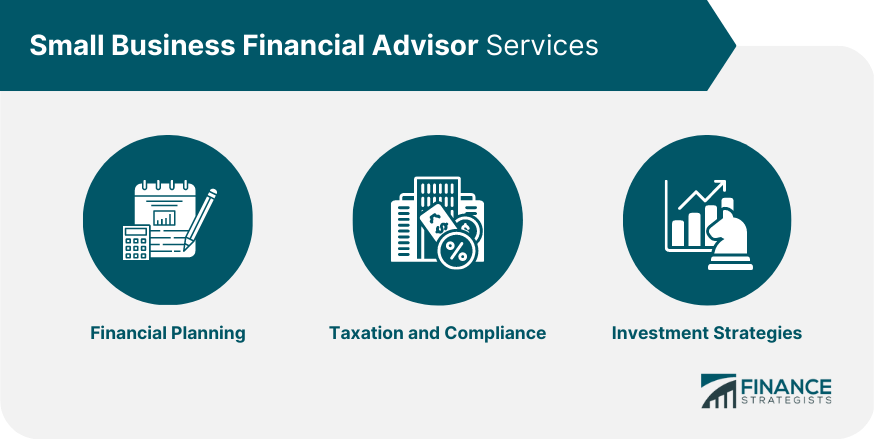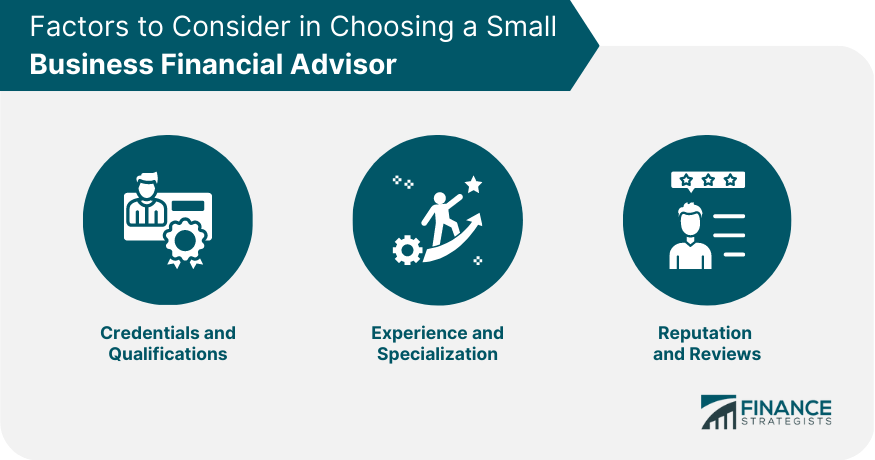A small business financial advisor is a professional who provides financial advice and guidance to small businesses, including financial planning, budgeting, accounting, taxation, investment strategies, and risk management. They help small businesses manage their finances effectively and efficiently, reducing expenses, increasing revenue, and improving cash flow. Small business financial advisors play a crucial role in the success of small businesses by providing expert financial advice and guidance to achieve long-term financial stability and success. Small business financial advisors play a crucial role in the success of small businesses. They help small businesses manage their finances effectively and efficiently, which is vital for long-term growth and sustainability. These advisors help small businesses develop a financial plan that aligns with their business goals and objectives. They provide insights and recommendations on managing cash flow, investing funds, reducing expenses, and increasing revenue. Small business financial advisors also assist in identifying potential financial risks and devising strategies to mitigate them. Small business financial advisors provide a wide range of services to help small businesses manage their finances. Some key services small business financial advisors provide include financial planning, taxation and compliance, investment strategies, and risk management. Small business financial advisors help small businesses develop a comprehensive financial plan that considers the business's goals, objectives, and financial resources. This plan typically includes a budgeting and forecasting component, which helps small businesses plan their expenses and revenues. They also assist with cash flow management, helping small businesses maintain a positive cash flow and avoid cash flow problems. Financial analysis and reporting are additional services that small business financial advisors provide, helping small businesses make informed financial decisions based on accurate financial information. These professional financial advisors provide assistance with taxation and regulatory compliance, ensuring that small businesses comply with relevant laws and regulations. Tax planning and preparation are crucial services that small business financial advisors provide, helping small businesses minimize their tax liabilities and take advantage of tax incentives. Regulatory compliance services include ensuring that small businesses comply with local, state, and federal regulations related to business operations. Small business financial advisors assist with investment strategies, helping small businesses invest their funds wisely to achieve long-term financial goals. Asset allocation and diversification are key investment strategies that small business financial advisors recommend, assisting small businesses to balance their investment portfolio to minimize risks and maximize returns. Retirement planning and wealth management are additional investment strategies that small business financial advisors provide. Choosing the right small business financial advisor is essential for the success of a small business. Credentials and qualifications, experience and specialization, and reputation and reviews are critical factors to consider when selecting a small business financial advisor. Small business financial advisors must have relevant credentials and qualifications, such as a Certified Public Accountant (CPA) or Chartered Financial Analyst (CFA) designation. These credentials ensure that the small business financial advisor has the necessary education, training, and experience to provide high-quality financial advice and guidance to small businesses. Experience and specialization are also critical factors to consider when selecting a small business financial advisor. Small business financial advisors with experience working with small businesses in the same industry as the business owner are more likely to provide relevant and valuable financial advice. Additionally, small business financial advisors specializing in a particular area, such as taxation or investment strategies, can provide more focused and tailored advice to small businesses. Reputation and reviews are also essential when selecting a small business financial advisor. Small business owners can research small business financial advisors online, review their professional backgrounds, and read reviews from other small business owners who have used their services. These reviews can provide valuable insights into the quality of service provided by small business financial advisors and their ability to meet the needs of small businesses. Hiring a small business financial advisor has several benefits for small businesses. Small business financial advisors provide expert financial advice and guidance, helping small businesses make informed financial decisions. They also help small businesses manage their finances more efficiently, reducing expenses, increasing revenue, and improving cash flow. Additionally, small business financial advisors can help small businesses identify potential financial risks and develop strategies to mitigate them, reducing the likelihood of financial losses. The future outlook for small business finance is positive, with continued growth expected in the small business sector. As the economy recovers from the COVID-19 pandemic, small businesses are expected to play a crucial role in driving economic growth. Small business financial advisors are expected to continue to play a vital role in helping small businesses navigate the financial landscape and achieve long-term success. Small business owners seeking financial advice and guidance should consider hiring a small business financial advisor. When selecting a small business financial advisor, it is essential to consider credentials and qualifications, experience and specialization, and reputation and reviews. Hiring a small business financial advisor has several benefits, including expert financial advice and guidance, efficient financial management, and risk mitigation. As the economy continues to recover and the small business sector continues to grow, small business financial advisors are expected to play an increasingly critical role in helping small businesses achieve long-term financial success. Small business financial advisors offer essential financial advice and guidance, helping small businesses manage their finances effectively and efficiently. They provide a wide range of services, including financial planning, taxation and compliance, investment strategies, and risk management. When choosing a small business financial advisor, one must consider their credentials, experience, specialization, and reputation. Hiring a small business financial advisor has several benefits, including expert financial advice, efficient financial management, and risk mitigation. As the small business sector grows, small business financial advisors are expected to play an increasingly critical role in helping small businesses achieve long-term financial success. If you are a small business owner, hiring a small business financial advisor could be one of the best decisions you make for your business. It can help you make informed financial decisions, manage your finances effectively, and ultimately increase your chances of success.What Is a Small Business Financial Advisor?
The Importance of Small Business Financial Advisors
Key Services Provided by Small Business Financial Advisors
Financial Planning for Small Businesses
Taxation and Compliance for Small Businesses
Investment Strategies for Small Businesses

Choosing a Small Business Financial Advisor
Credentials and Qualifications
Experience and Specialization
Reputation and Reviews

Benefits of Hiring a Small Business Financial Advisor
Future Outlook for Small Business Finance
Final Recommendations for Small Business Owners
Final Thoughts
Small Business Financial Advisor FAQs
A small business financial advisor is a professional who provides financial advice and guidance to small businesses, including financial planning, budgeting, accounting, taxation, investment strategies, and risk management.
Hiring a small business financial advisor is important because they help small businesses manage their finances effectively and efficiently, reducing expenses, increasing revenue, and improving cash flow. Additionally, they can help small companies identify potential financial risks and develop strategies to mitigate them, reducing the likelihood of financial losses.
Small business financial advisors provide a wide range of services, including financial planning, taxation and compliance, investment strategies, and risk management. They help small businesses develop a comprehensive financial plan that aligns with their business goals and objectives, assist with tax planning and preparation, help small enterprises to invest their funds wisely to achieve long-term financial goals, identify potential economic risks, and devise strategies to mitigate them.
When selecting a small business financial advisor, it is essential to consider their credentials and qualifications, experience and specialization, and reputation and reviews. Look for a Small Business Financial Advisor with relevant certifications and qualifications, experience working with small businesses in the same industry as your business, and positive reviews from other small business owners.
Hiring a small business financial advisor has several benefits, including expert financial advice and guidance, efficient financial management, and risk mitigation. They can help small businesses make informed financial decisions, manage their finances effectively, and reduce the likelihood of financial losses, ultimately increasing the chances of long-term financial success.
True Tamplin is a published author, public speaker, CEO of UpDigital, and founder of Finance Strategists.
True is a Certified Educator in Personal Finance (CEPF®), author of The Handy Financial Ratios Guide, a member of the Society for Advancing Business Editing and Writing, contributes to his financial education site, Finance Strategists, and has spoken to various financial communities such as the CFA Institute, as well as university students like his Alma mater, Biola University, where he received a bachelor of science in business and data analytics.
To learn more about True, visit his personal website or view his author profiles on Amazon, Nasdaq and Forbes.











